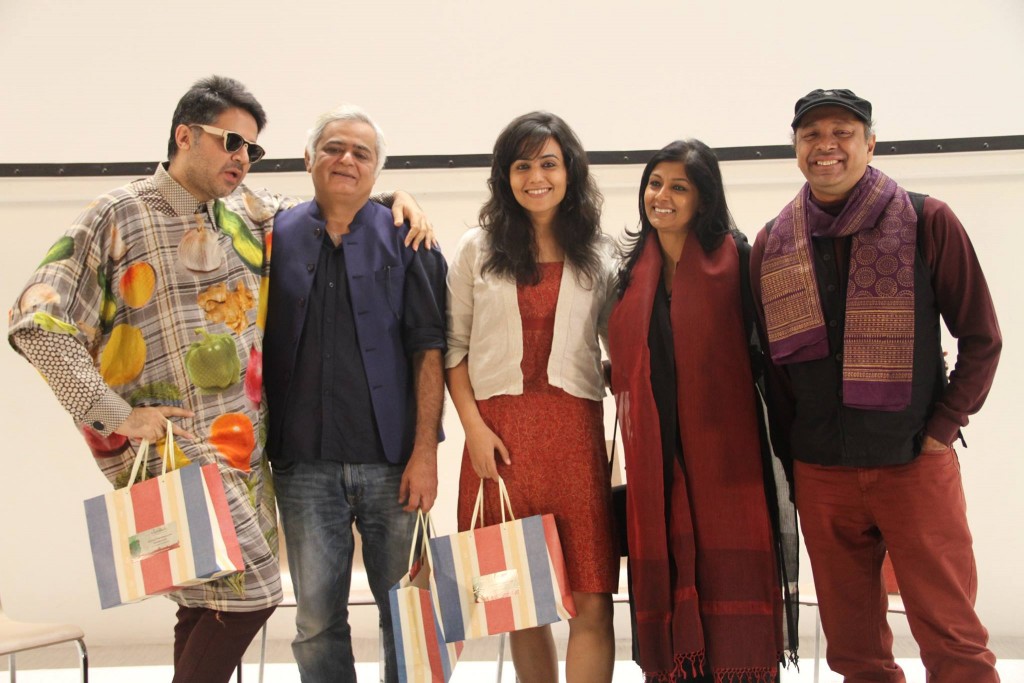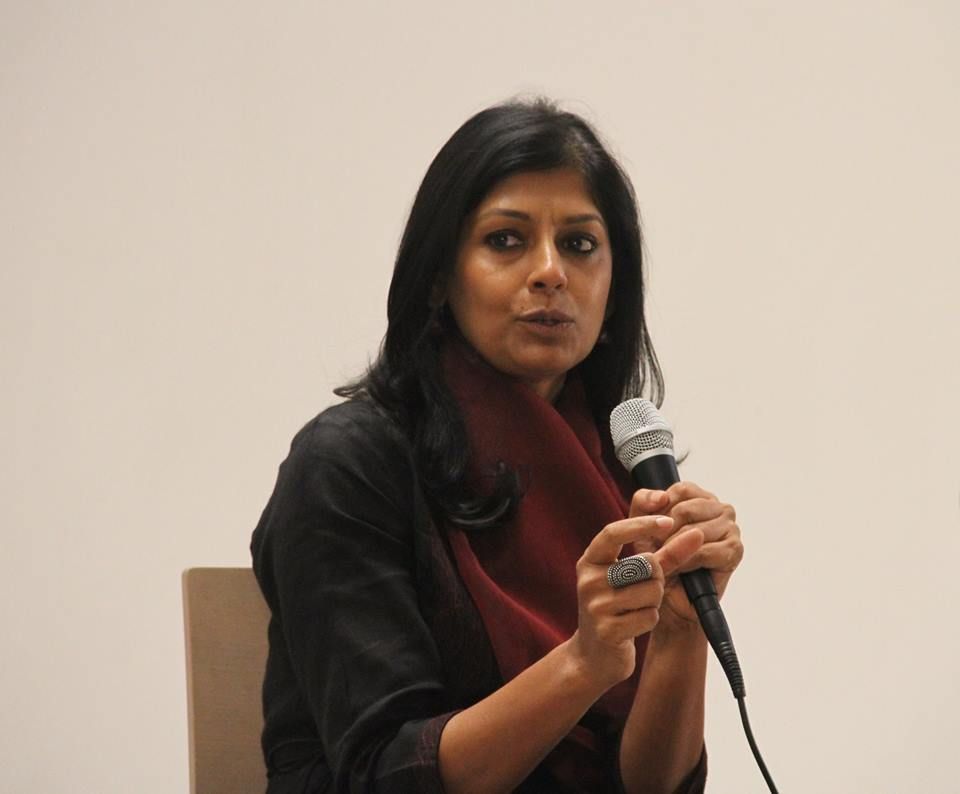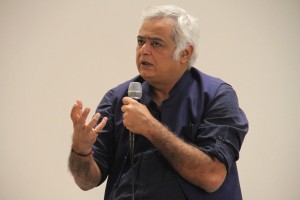NANDITA DAS, HANSAL MEHTA AT BEST OF KASHISH
Award-winning LGBT films screened at Godrej India Culture Lab

To celebrate LGBT pride month in Mumbai, KASHISH Mumbai International Queer Film Festival in association with The Godrej India Culture Lab presented the Best of KASHISH – A Spotlight on Queer Cinema on January 23, 2016. The day-long event screened award winning LGBT films from India and across the world, and also hosted a power-packed panel discussion ‘Pride and Prejudice – Building Alliances for a Better Tomorrow’ that explored the importance of straight allies in the movement for equal rights for people who identify as LGBT. The power packed panel comprised veteran filmmaker Hansal Mehta, noted actor-director Nandita Das, screenwriter Gazal Dhaliwal and Festival Director of KASHISH, Sridhar Rangayan. The panel was moderated by Parmesh Shahani, head of Godrej India Culture Lab. This mini film festival was a part of the month-long celebration of events leading up to Mumbai’s Queer Azaadi March.
“Over the last six years KASHISH has emerged as South Asia’s biggest and only mainstream LGBT film festival. It has become the biggest platform in the country for filmmakers wanting to explore LGBT lives,” said Sridhar Rangayan. “The Pride month is big in Mumbai andKASHISH is happy to be a part of it. Since our festival shifted to South Mumbai, there have been many requests from film lovers to watch LGBT films in the suburbs. The ‘Best of KASHISH‘ event is a great opportunity for film lovers in central suburbs to catch up with award winning and audience favourite films from KASHISH. But, what makes the day long event even memorable is the panel discussion with renowned filmmakers and writers, making it yet another innovative and memorable experience,” added Rangayan.
Shahani, said that the Best of KASHISH at Godrej India Culture Lab was a proud moment. “Godrej has been a strong supporter of LGBT rights in India and our Culture Lab has been the venue of several previous LGBT themed events over the past five years, such as book readings, film screenings, theatre and dance performances and panel discussions!” said Shahani.
The films that were screened included the Dutch coming-of-age film Boys directed by Mischa Kamp that won the Best Narrative Film Award at KASHISH 2015, Marathi films Shot directed by Ganesh Matkari, Sundar directed by Rohan Kanawade, Ek Maya Ashi Hi (A Love Such As This) by Vaibhav Hatkar and the Tamil film Mudivai Thaedum Muttripulli (A Full Stop That Searches For Its End) by Vivek Vishwanathan among other films from across the world.
Top Ten Quotes at the panel discussion (Source: The Godrej India Culture Lab team)
Nandita Das on the impact of Fire
Films have an intangible impact because they go into your subconscious and affect you. I believe a lot of the conversations we are having today, whether it was the Delhi High Court ruling or about Section 377, were impacted by Fire in some small way. The film gave a vocabulary to talk about same-sex relationships.
Nandita Das on cinema today
Fire was a landmark film because there was not a single cut. After the attacks on theatres after the film was released, it was sent back to the censors. But hey upheld their verdict and did not cut any scenes from the movie. Look at the kind of things they are trying to ban and censor right now. We have regressed as a country in some ways.
Hansal Mehta on censors
The censors did not ask for a cuts on Aligarh, which was a big deal for me. They wanted a scene where Manoj Bajpai falls off to sleep in court to be removed. (laughs) I am fighting that cut right now.
Hansal Mehta on mainstreaming LGBT issues
The film is a lot about loneliness. It is not necessarily about a gay relationship, but rather about finding companionship. The film deals with broader issues and we need to do that if we want talk about LGBT issues in the mainstream. If we have to tackle Section 377 or LGBT rights, I believe it needs to be looked at with a much wider lens. The conversation needs to be mainstreamed. It should not be put in a box.
Gazal Dhaliwal on coming out on national television
It was great that my coming out happened on Satyameva Jayate. I think it is important for conversations around LGBT rights to be spoken about in the mainstream media which includes films and TV. I think television is even more important as it has the power to change people, because its reach is so wide.
Sridhar on subversive LGBT content
In a lot of television episodes that I would direct, I used to add some cloaked homoeroticism. Some character would come out of the bathroom after taking a shower! So I would consciously include a gay male gaze. The actors didn’t know what my intent was, but my friends knew exactly what I was doing. (laughs)
Nandita Das on fighting the other-ing of minorities
During Women’s Day there are all these marches with women screaming and shouting and that has had an impact of course. But the men have not changed because there is very little work happening on them. Similarly, when KASHISH is attended more by straight people, change will come. There needs to be a sense of belonging even from the straight community. The burden of the LGBT coming out should not only be on the LGBT community.
Hansal Mehta on being politically correct
I had a gay writer (Apurva Asani) and a transgender DOP (Satya Rai Nagpaul) who were constantly correcting me if I was being insensitive. I realized that one is so conditioned society that you don’t even realize when you are being homophobic.
Sridhar Rangayan on mainstreaming LGBT characters
Mainstream cinema has been too slow in changing its portrayal of LGBT cinema. The reason I started KASHISH, is because I found that short films, documentaries and indie cinema is looking at LGBT issues with a lot more empathy. At KASHISH we are trying to start a film fund so that indie films will now have a chance to hit the mainstream.
Gazal on normalizing LGBT characters
Cinema reflects society, but some cinema also makes society reflect on itself. That’s’ the kind of cinema I would love to make. I want to make films where gay and lesbian characters are not just mocked at. It could be a run-of-the-mill rom-com between two gay characters, or a murder mystery where one boyfriend has lost gay lover. That’s how you will normalise these narratives. These stories just need to be out there. They don’t need to be political.

NANDITA DAS

